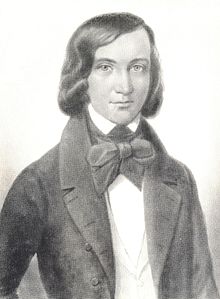Nikolai Stankevich
This article needs additional citations for verification. (August 2021) |
Nikolai Stankevich | |
|---|---|
 | |
| Born | Nikolai Vladimirovich Stankevich October 9, 1813 |
| Died | July 7, 1840 (aged 26) Novi Ligure, Italy |
| Era | 19th century philosophy |
| Region |
|
show
Influences | |
show
Influenced | |
Nikolai Vladimirovich Stankevich (Russian: Никола́й Влади́мирович Станке́вич) (October 9 [O.S. September 27] 1813 – July 7 [O.S. June 25] 1840) was a Russian public figure, philosopher, and poet.
Biography[]
Nikolay Stankevich was born in Uderevka, Voronezh Governorate, and in 1834 graduated from the Moscow State University, where he was influenced by Professor and followers of the so-called "skeptical school" in historiography. By late 1831, Stankevich had organized a literary and philosophical society called the Circle of Stankevich. He had been under police surveillance since 1833 due to his connections with a group of oppositionary university students led by Ya.I. Kostenetsky.[1] In 1837, Nikolay Stankevich had to travel abroad due to his tuberculosis.[2]
Stankevich's literary and esthetical views, most of which mirrored the ideas of a Russian historian Nikolai Nadezhdin, presupposed the humanistic enlightenment as the main task of the Russian intelligentsia. Stankevich is known to have considerably influenced some of the Russian and Muscovite intelligentsia in particular, including Vissarion Belinsky, Timofey Granovsky, Mikhail Bakunin, and Alexander Herzen. Among Stankevich's literary works (mostly poetic and not numerous), there are a few verses dedicated to Moscow and a historical tragedy called Vasili Shuisky.[3]
He died, aged 26, in Novi Ligure, Italy.
References[]
Footnotes[]
- ^ Nicholas Hans, The Russian Tradition in Education, Routledge, 2002, p. 32
- ^ Paul Bushkovitch, A Concise History of Russia, Cambridge University Press, 2011, p. 162
- ^ Svalov A. N. On N. V. Stankevich's Tragedy "Vasiliy Shuiskiy" (The Academy of Social Sciences, Moscow)
Bibliography[]
- Serge N. Evanow, N.V. Stankevich and His Circle: The Idealistic Movement of the 1830s, University of California, Berkeley, 1953, 226 pages.
- Edward J. Brown, Stankevich and His Moscow Circle, 1830-1840, Stanford University Press, 1966, 149 pages.
- John W. Randolph, The House in the Garden: The Bakunin Family and the Romance of Russian Idealism, Cornell University Press, 2007, Chapter VI.
- Peter K. Christoff, K.S. Aksakov, A Study in Ideas, Vol. III: An Introduction to Nineteenth-Century Russian Slavophilism, Princeton University Press, 2004, Chapter II.
- 1813 births
- 1840 deaths
- People from Alexeyevsky District, Belgorod Oblast
- People from Voronezh Governorate
- Russian philosophers
- Russian male poets
- Moscow State University alumni
- Liberals of the Russian Empire
- 19th-century poets
- 19th-century Russian male writers